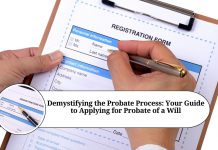Capital Gain on the Sale of Property: Understanding the Basics
Selling a property can be a great way to make a profit, but it’s important to understand the tax implications of such a transaction. Capital gains tax (CGT) is levied on any profit that you make from the sale of a property, which means that you’ll need to be aware of how it’s calculated and how you can reduce your liability.
What is Capital Gain Tax (CGT)?
Capital gain tax is a tax that is charged on the profit made from the sale of an asset. In the context of property, this means the difference between the sale price and the cost of the property at the time of purchase. If the sale price is higher than the cost price, you have made a capital gain, which is taxable.
Calculating Capital Gain Tax on the Sale of Property
The capital gain is calculated by deducting the cost of the property, including any purchase-related expenses, from the sale price. You can also claim a range of expenses to offset the capital gain, such as any costs associated with the sale, such as marketing and legal fees, as well as any improvements that you have made to the property.
The capital gain is then added to your taxable income for the financial year in which the property was sold, and tax is charged at your marginal tax rate.
Reducing Your CGT Liability
There are a range of strategies that you can use to reduce your CGT liability, including:
- Claiming expenses: As mentioned earlier, you can claim a range of expenses to offset your capital gain, such as legal fees and improvements to the property.
- Holding the property for longer: If you hold the property for more than 12 months, you may be eligible for a 50% discount on the capital gain.
- Utilizing the main residence exemption: If the property is your main residence, you may be eligible for a full or partial exemption from CGT.
- Using a self-managed super fund (SMSF): If you have an SMSF, you may be able to transfer the property into the fund, which can provide a range of tax benefits.
Conclusion
If you’re considering selling a property, it’s important to understand the implications of capital gains tax. By calculating your potential liability and utilizing strategies to reduce it, you can maximize your profits and minimize your tax bill. Be sure to consult with a tax professional for personalized advice.
Read Other Useful Blogs:
Frequently Asked Questions about Capital Gain on Sale of Property:
Q.1 What is capital gains tax, and how is it calculated on the sale of a property?
Capital gains tax is a tax that is levied on the profit made from the sale of an asset, including property. It is calculated by subtracting the cost of the property at the time of purchase and any purchase-related expenses from the sale price. The capital gain is then added to your taxable income for the financial year in which the property was sold, and tax is charged at your marginal tax rate.
Q.2 Can I reduce my capital gains tax liability when I sell my property?
Yes, there are several strategies that you can use to reduce your CGT liability, including claiming expenses, holding the property for longer than 12 months to receive a 50% discount, utilizing the main residence exemption, or transferring the property into a self-managed super fund (SMSF).
Q.3 What expenses can I claim to offset my capital gain on the sale of a property?
You can claim a range of expenses to offset your capital gain, such as legal fees and improvements to the property. It’s important to keep receipts and documentation to support your claims.
Q.4 Can I get an exemption from capital gains tax if the property is my primary residence?
Yes, if the property is your main residence, you may be eligible for a full or partial exemption from CGT. However, there are specific criteria that must be met, such as living in the property for a minimum period and not using it to generate income.
Q.5 Do I need to pay capital gains tax if I sell an inherited property?
Yes, if you sell an inherited property and make a profit, you may be liable for capital gains tax. The cost base of the property will be the market value of the property at the date of the previous owner’s death.
Q.6 Do I need to report the sale of a property on my tax return?
Yes, you must report the sale of a property on your tax return, including the capital gain or loss made from the sale.
Q.7 Can I defer paying capital gains tax if I reinvest the proceeds from the sale into another property?
Yes, you may be eligible for a capital gains tax deferral if you reinvest the proceeds from the sale into another property, such as through a 1031 exchange in the US or a rollover relief in Australia. However, there are specific criteria that must be met, such as timeframes for reinvestment and property value requirements.































